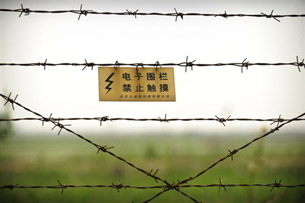China: Crackdown on North Koreans
| Publisher | Radio Free Asia |
| Publication Date | 28 September 2009 |
| Cite as | Radio Free Asia, China: Crackdown on North Koreans, 28 September 2009, available at: https://www.refworld.org/docid/4acb417617.html [accessed 21 May 2023] |
| Disclaimer | This is not a UNHCR publication. UNHCR is not responsible for, nor does it necessarily endorse, its content. Any views expressed are solely those of the author or publisher and do not necessarily reflect those of UNHCR, the United Nations or its Member States. |
2009-09-28
As China tightens security ahead of a major anniversary, North Korean refugees are even less welcome.
 A warning sign is shown on a barbed-wire fence separating China and North Korea, May 27, 2009. AFP
A warning sign is shown on a barbed-wire fence separating China and North Korea, May 27, 2009. AFP
SEOUL – Authorities in northeastern China are cracking down on North Korean refugees living illegally on the Chinese side of the border, according to aid workers in the region who spoke on condition of anonymity.
The crackdown, marked by a heavier police presence and more detentions, began in July, according to several witnesses who work with the large number of North Koreans living in the area.
It coincides with stepped-up security throughout China ahead of major celebrations planned for Oct. 1 to mark the 60th anniversary of Chinese Communist Party rule, following a series of deadly ethnic clashes.
"These days, many groups of police are everywhere," one aid worker, who asked to be identified by the pseudonym Eun-Sook Han, said in an interview.
"It seems as if the Chinese government is searching for refugees in every nook and corner," she added.
Another aid worker reported that in July police detained a North Korean woman who had been in northeast China for more than 10 years as she pulled weeds in a field for 30 yuan (about U.S. $4) a day, as her 10-year-old son watched.
The aid worker's organization tried unsuccessfully to secure her release with a bribe, he said.
China doesn't release information related to North Korean refugees living inside its borders, and the fate of those North Koreans who have been detained is unclear, although they have historically been forcibly repatriated and could face lengthy terms at hard labor at home.
Western diplomats and rights group estimate the number of North Koreans living in China at anywhere from tens of thousands to several hundred thousand, including a large number of women who are trafficked into China as "brides" or sex workers.
Thousands of defectors
Nearly all North Korean defectors flee poverty and malnutrition initially to neighboring China, where they learn about life in other countries.
South Korea has taken in about 20,000 North Korean defectors since the end of the 1950-53 Korean War, most of them in the last decade.
China, North Korea's staunchest communist ally, sees North Korean defectors as economic migrants rather than refugees and deports them under a secret agreement with North Korea, where they face persecution and prison time after their return.
China also fears that North Korean refugees will become a permanent burden.
U.S. and international human right organizations have urged China to ensure that the return of any North Koreans is consistent with China's obligations under various human rights conventions.
China has also come under fire for its failure to allow access to North Korean refugees seeking asylum abroad by the U.N. High Commissioner for Refugees.
Original reporting by Han Kim. Edited by Sarah Jackson-Han.
Link to original story on RFA website
